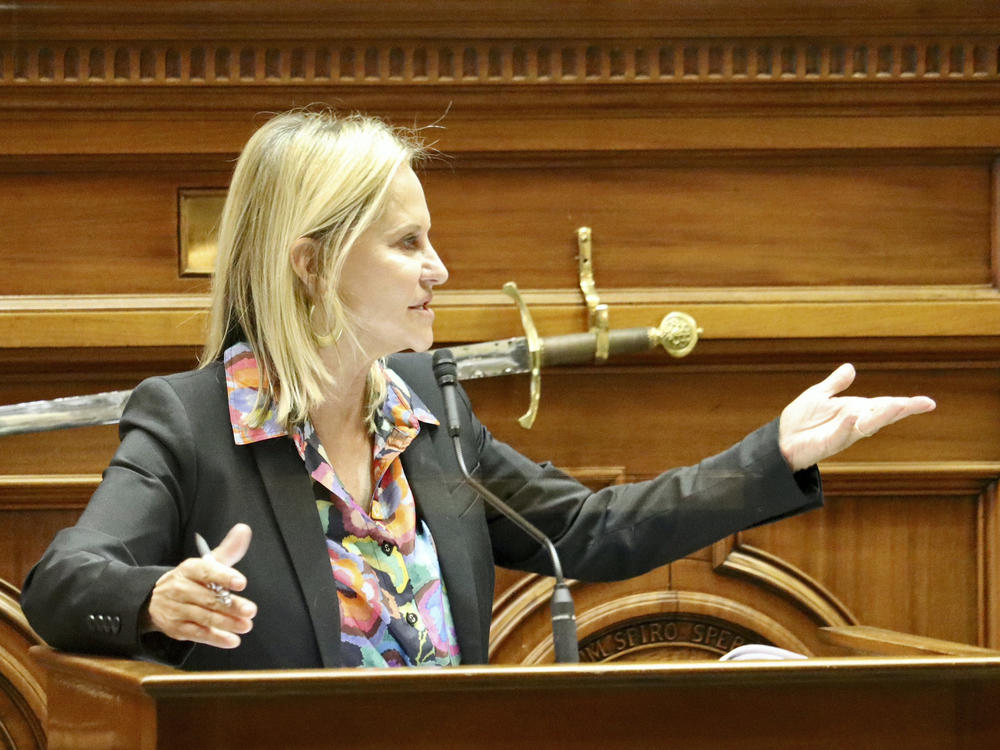Section Branding
Header Content
This Republican S.C. lawmaker helped block a 'crazily oppressive' abortion bill
Primary Content
Sandy Senn believes that legislators cannot tell a woman what is best for her own life.
Who is she? Sen. Sandy Senn is a South Carolina Republican who represents the 41st district in Charleston.
- She took office in 2016 and has focused on issues relating to flooding, advocating for law enforcement, improving infrastructure, and offering vocational training to students in addition to a traditional high school education.
What's the big deal? Senn has recently taken a stand on another polemic issue that is sowing division within the GOP: abortion rights.
- This past week, a near-total abortion ban in South Carolina failed in the Senate after the only five female lawmakers in the chamber united in a days-long filibuster in opposition to the bill.
- Senn was one of them, joining two other Republicans, as well as a Democrat and an Independent. Senn criticized Majority Leader Shane Massey, saying he was leading the party "blindly off the cliff."
- This is the third time that a bill aiming to effectively ban abortions in the Palmetto state has been proposed since the overturn of Roe v. Wade last year. This iteration would have banned abortion at conception with few exceptions for rape, incest, and life-threatening health complications for the fetus or mother.
For more on politics, listen to the Consider This episode on John Fetterman's return to Congress.
What is she saying?
While filibustering, Sen. Senn said the issue was about control.
Abortion laws, each and every one of them, have been about control. It's always about control, plain and simple. And in the senate, the males all have control. We, the women, have not asked for ... nor do we want your protection. We don't need it. There is not a single thing I can do when women such as me are insulted except make sure that you get an earful.
Senn spoke with NPR's Melissa Block on Friday to discuss her stance on reproductive rights, and what she sees for the future of the GOP's position on the issue.
On her opposition to South Carolina abortion ban:
It is crazily oppressive. I don't like any bills that, to me, are radical. And whether that's from the left or the right. And I do just so much wish that politics would move more toward the middle. And on these divisive issues, it just needs to be on a ballot. And the men in our legislature, they're just not going to let that happen. And our legislature is overwhelmingly male.
On what role she believes the government should have in regulating abortion:
In my view, this is just where I've come down and it's the best moderate place that I know to be, is first trimester, with exceptions. But these people, especially over in the House of Representatives, they've got a caucus over there called the Freedom Caucus. They are just hell-bent that it is going to be zero abortion or nothing, they say that they're not going to go within six weeks, not going to go 12 weeks, it's going to be zero or nothing.
So right now, they're stuck with the law that's up to 22 weeks. And then they turn around and call me a baby killer. I got a postcard that got released in my district that said that I had killed 5,000 babies this year.
So, what now?
- The 22-21 vote blocked the bill with six Republicans blocking motions to end debate and defeat any chance the bill passes this year, according to the Associated Press.
- Senn remains skeptical of the GOP movement within her state to ban abortions before six weeks, saying the votes are not there, and won't even be conceivable until 2024: "I just hope the result is not going to be that I get kicked out or that others get kicked out. I hope the result is going to be more women running and more moderates are elected."
Learn more:
- Poll: Americans want abortion restrictions, but not as far as red states are going
- In Oklahoma, a woman was told to wait until she's 'crashing' for abortion care
- Abortion policies could make the Republican Party's 'suburban women problem' worse
Copyright 2023 NPR. To see more, visit https://www.npr.org.

